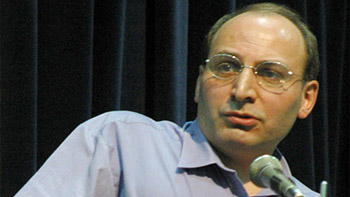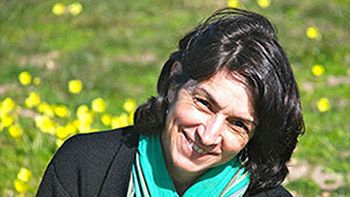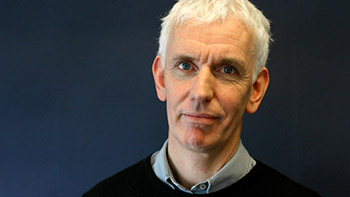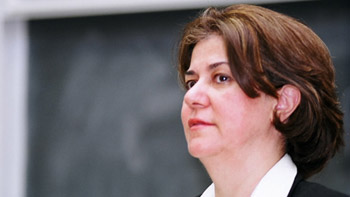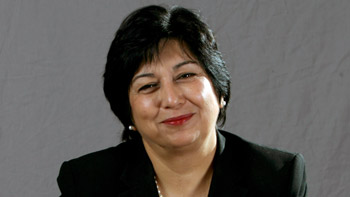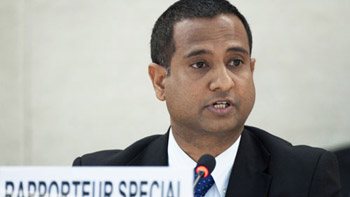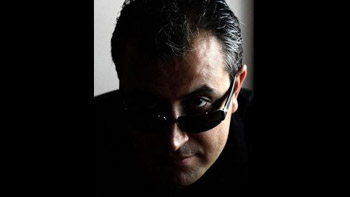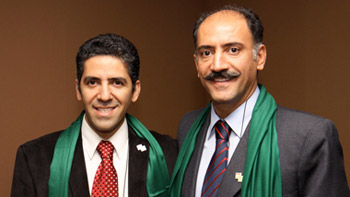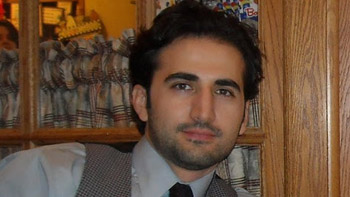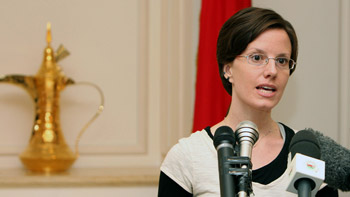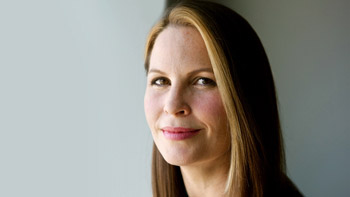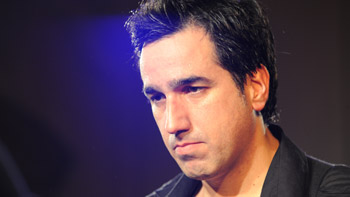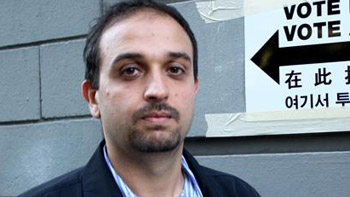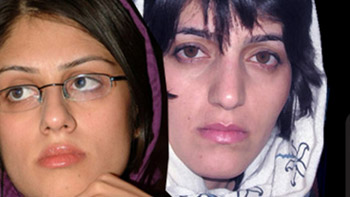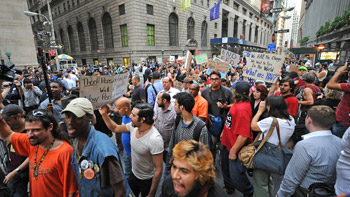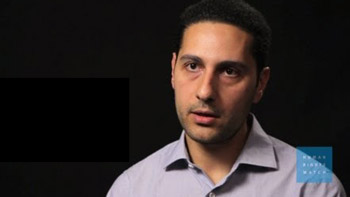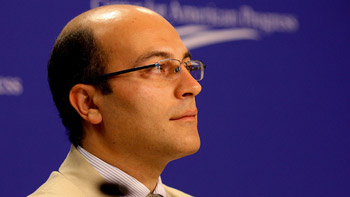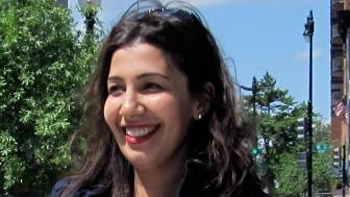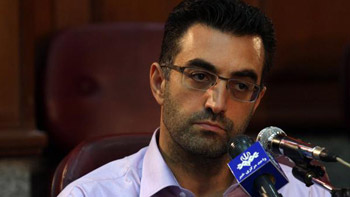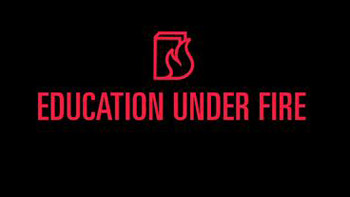Jennifer Utz
Audio Podcasts on Iran Human Rights: Producer, Researcher, Writer, Host, Editor
Audio Podcasts on Iran Human Rights: Producer, Researcher, Writer, Host, Editor
Podcast: Children of the Jacaranda Tree
Children of the Jacaranda Tree, by Sahar Delijani, is a stunning debut novel set in post-Revolutionary Iran.
Told in interconnected, alternating perspectives, the book follows three generations of men and women, some linked by family,
others brought together by the tide of history that forces its way into their lives.
The story follows political prisoners, not knowing whether torture, execution, or release is around the corner, and
caretakers on the outside—the grandparents and siblings holding their families together while their loved ones are imprisoned.
The story moves from the nightmarish reign of terror and hellish secret prisons, through the first ripples of new dissent some
thirty years later—Iran’s post-revolutionary generation, the children of the detained, repressed, and persecuted.
At the novel’s center is a single tragedy which leaves both the creators of the revolution and their children permanently scarred and traumatized.
Drawing comparisons to the The Kite Runner and In the Shadow of the Banyan, it’s an evocative look at the intimate side of revolution.
Today we speak with the author, Sahar Delijani, whose life and family inspired much of the book’s narrative.
Role: Producer, Researcher, Writer, Interviewer, Editor
Podcast: Small Acts of Resistance
“When people tell you that nothing will ever really change, just remember that however clever and intelligent they sound,
they have kind of been proved wrong on many occasions in the past,” Steve Crawshaw, co-author of Small Acts of Resistance, tells us.
Big change begins with small acts – many of which may have looked pointless at the time. Such is the idea behind Small Acts of
Resistance, a compilation of tales from around the world – acts of resistance, defiance, and disobedience by average citizens
standing up to say no to autocratic and abusive governments.
The book is written by Steve Crawshaw, international advocacy director of Amnesty International, and John Jackson, a long-term
campaigner for human rights and other major international issues.
More information on Small Acts of Resistance is available at www.smallactsofresistance.com. A Persian translation of the book is
available as a free download here.
Role: Producer, Researcher, Writer, Interviewer, Editor
Podcast: Nonviolence in Iran
“Capital punishment itself is a form of premeditated murder,” Ramin Jahanbegloo tells us in today’s podcast. Today we discuss a culture of violence
that’s become deeply entrenched in Iranian society. State violence in the form of inhumane executions, cruel and unusual punishments, brutality in
response to public dissent, and ill treatment and torture throughout the judicial system, is pervasive, and some argue that Iran’s citizens have
become acclimated and desensitized to this violence.
Ramin Jahanbegloo is an Iranian philosopher, academic, and scholar on nonviolence.
In April 2006, he was arrested at Tehran’s airport and charged with preparing a velvet revolution in Iran.
He was placed in solitary confinement for four months and later released on bail. He’s now based in Canada, where
he teaches political science at York University in Toronto. He’s most widely known for his work promoting dialogue
between cultures and his advocacy for non-violence.
Role: Producer, Researcher, Writer, Interviewer, Editor
Podcast: Iranian Literature
“Literature, whether it’s poetry or fiction or non-fiction, offers a different kind of perspective, often one that’s more rooted in the human story, as opposed to the governmental,
political narrative that I think is the sort of pervasive narrative that people hear all the time,” literature professor and poet Persis Karim tells us.
In today’s podcast, Karim talks about the literature of the Iranian diaspora and the creative restrictions on writers within Iran. She also reads us a poem
she wrote, based on true events, called “The Execution of Atafeh.”
Persis Karim, poet, professor, and editor, will be in New York City on December 4th at the Asia Society for an event called
“Shattering the Stereotypes: Iranian Americans in Fiction.” She’ll be in discussion with three other Iranian-American writers.
For more on this event, go to asiasociety.org. Her latest anthology, “Tremors: New Fiction by Iranian American writers,” is available now.
You can also learn more about her on her website at persiskarim.com.
Role: Producer, Researcher, Writer, Interviewer, Editor
Podcast: Dr. Nayereh Tohidi
Iran was one of the first countries in the Middle East to allow women to study at university,
and since the 1990s, more than 60 percent of Iran’s university students have been women.
But at the start of the new Iranian academic year this past September, the government began
imposing restrictions on university students, and the most affected are women. More than 30 universities
introduced new rules banning female students from almost nearly 80 different degree courses – from engineering, nuclear physics and computer science, to English literature, archaeology and business.
The new rules also include quotas that limit the percentage of women students in certain fields of study,
as well as segregation in classrooms and facilities. This means many women will no longer be able to pursue the education and careers of their choice.
Our guest today is Dr. Nayareh Tohidi, Professor of Gender & Women Studies at California State University,
Northridge. She is also the Research Associate at the Center for Near Eastern Studies of UCLA where she has been coordinating the Bilingual Lecture Series on Iran since 2003.
Role: Producer, Researcher, Writer, Interviewer, Editor
Podcast: Elahe Amani
In late February of 2012, Iran announced that ‘We reformed the penal code, and there is a ban on death penalty by stoning and
execution of minors.’ But . . . during the course of [the] last three decades, stoning has been claimed to be banned and then
practiced,” gender, peace, and social justice activist Elahe Amani told the International Campaign for Human Rights in Iran.
Elahe Amani joins us today to discuss women’s issues in Iran, including stoning. She has written about discriminatory laws,
gender-based violence, and the punishment of stoning, among many other topics. She actively speaks at the UN Commission on the
Status of Women, and is currently the chair of Women’s Intercultural Network.
For more of Elahe Amani’s work on women’s rights in Iran, see her writings on Open Democracy and
Women’s News Network.
Role: Producer, Researcher, Writer, Interviewer, Editor
Podcast: Dr. Ahmed Shaheed
Referencing “key opposition leaders in detention” and “quite serious webs of arrests of journalists,”
Dr. Ahmed Shaheed says, “In an election year, these kinds of activities can negate any sense of a legitimate free and fair election.”
The UN Human Rights Council renewed the mandate of Special Rapporteur for human rights in Iran Ahmed Shaheed in
March. In today’s podcast, Dr. Shaheed speaks with us about the upcoming presidential elections in Iran, recent
attacks on women’s rights, the Iranian government’s refusal to allow him to enter the country, and what he hopes
to achieve in his next term.
Role: Producer, Researcher, Writer, Interviewer, Editor
Podcast: Nik Kowsar on Editorial Cartoons
Nikahang Kowsar is a blogger, journalist, and political cartoonist who doesn’t shy away from controversy.
In his cartoons, he frequently criticizes the Iranian leadership and draws attention to very sensitive issues,
including human rights abuses. In today’s podcast, he talks to us about one cartoon in particular that drew
death threats, and even arrest and imprisonment.
“I think I knew that I needed to hit back, on those people who were blaming the media and calling them ‘stooges
of the West.’ Because this was actually attacking our independence, attacking our ideas,” Kowsar tells us.
Here Kowsar talks about his cartoons, journalism, activism, and his life in Iran and after leaving in 2003. His
work is featured in the International Campaign for Human Rights in Iran’s new book, 'Sketches of Iran: A Glimpse from the Front Lines of Human Rights.'
Role: Producer, Researcher, Writer, Interviewer, Editor
Podcast: Dr. Ahmeed Shaheed
“Discrimination is . . . quite widespread, whether it’s based on gender, religion, or ethnicity,” Dr.
Ahmad Shaheed tells us in this latest podcast. In March of 2011, increased international concern about
Iran’s human rights crisis led to the appointment of a United Nations’ Special Rapporteur on the situation
of Human Rights in the country. Dr. Ahmad Shaheed was appointed to monitor and report on the situation.
In today’s podcast, Dr. Shaheed talks with us about his latest report, criticisms of his work by the Iranian
government, and his hopes for the country’s future. We also speak at length about the prosecution of journalists
and bloggers, and “laws which are restricting … freedom of expression.”
Role: Producer, Researcher, Writer, Interviewer, Editor
Podcast: Tara Kangarlou on Internet Censorship and “Beyond the Electronic Curtain”
Today we speak with award-winning journalist Tara Kangarlou about her new film, “Beyond the Electronic Curtain,”
and the issue of Internet censorship in Iran.
“Beyond the Electronic Curtain” documents the effects of unrelenting censorship on Iranian society.
Through the stories of the many journalists in Iran who have been imprisoned for doing their job, the film
provides a glimpse into a country where people from all walks of life are deprived of their right to freedom of speech.
Role: Producer, Researcher, Writer, Interviewer, Editor
Podcast: On HIV/AIDS Work in Iran, an Interview with Drs. Arash and Kamiar Alaei
Today’s podcast covers the story and work of Arash and Kamiar Alaei, two Iranian doctors who were arrested
and imprisoned for their work as advocates of social change in their country.
Drs. Arash and Kamiar Alaei are brothers who built one of the world’s most successful community-based approaches
to treat and fight HIV/AIDS in Iran. Their work included a widespread use of needle-exchange programs, as well as
using methadone management for therapy. In addition, the brothers would often advocate for their patients in other ways,
including asking bosses to rehire fired employees or pleading with families to reunite with estranged loved-ones who were infected.
In 2008 they were arrested on charges of “communicating with an enemy government and conspiracy to overthrow the
Iranian government.” They were sent to Evin Prison, but after an international campaign on their behalf, the brothers were released.
Role: Producer, Researcher, Writer, Interviewer, Editor
Podcast: Sarah Hekmati on Her Brother Amir Hekmati, Imprisoned in Iran
Amir Hekmati, a 29 year-old US citizen and decorated Iraq war veteran, traveled to Iran in August of 2011 to visit his grandmother
and extended family. Within weeks of entering the country for the first time, he was arrested, interrogated, and sent to Evin Prison, with no explanation to his family.
Today his sister Sarah Hekmati joins us to discuss her brother’s background, his current situation, their father’s failing health,
and their family’s hopes for the future.
Role: Producer, Researcher, Writer, Interviewer, Editor
Podcast: Dr. Ahmeed Shaheed
This week, United Nations Special Rapporteur Ahmed Shaheed is expected to publish his latest report on human
rights in Iran. Today’s podcast features an interview with Dr. Shaheed conducted in May 2012, in which he
discusses his concerns about executions, torture, lack of due process, and treatment of juvenile offenders. He
also discusses the methodology for his reports, in light of Iranian authorities’ continued refusal to allow him to
enter the country to monitor the deteriorating human rights situation.
In March of 2011, increased international concern about Iran’s human rights crisis led to the creation of a United
Nations Special Mandate on the situation of human rights in Iran. Dr. Ahmed Shaheed was appointed to monitor and report
on the ongoing abuses. Although Iranian authorities have not yet allowed him into the country to do his research, he has
been documenting individual cases from afar, creating a comprehensive portrayal of the human rights crisis in Iran.
Role: Producer, Researcher, Writer, Interviewer, Editor
Podcast: Sarah Shourd on Her Time in Prison
Just over three years ago, three young Americans—Sarah Shourd, Shane Bauer and Joshua Fattal—were
taken into custody by Iranian border guards while hiking in Iraqi Kurdistan. Though the young Americans’
case was widely believed to be political theater, Iranian authorities insisted they had illegally crossed
over into Iranian territory in order to commit espionage; charges that were levied against Bauer and Fattal
over two years after their initial arrest. Shourd was released on bail after 14 months of detention on so-called
humanitarian grounds, and her two hiking companions were eventually also set free on bail in September 2011.
Today Sarah Shourd joins us to reflect on her time in Evin Prison, how it shaped her views on Iran and her
own mission in life, and what’s in store for her now. Sarah is currently working on a book with her husband
Shane Bauer, which will be out next year. You can also follow Sarah on her blog at the Huffington Post.
Role: Producer, Researcher, Writer, Interviewer, Editor
Podcast: Minky Worden on the Women of the Arab Spring
The stories of sweeping reform across the Middle East have captured the attention of many of us. In this week’s Weekly Rights Podcast, Minky Worden, Director of Global Initiatives at Human Rights Watch, talks to the Campaign about the effect that Arab Spring has had, and will have, on women. She talks about her new book, 'The Unfinished Revolution', which is a collection of women’s stories of struggle and defiance from around the world. Her book includes essays from Nobel Peace Prize laureate Shirin Ebadi and women’s rights activist and member of the One Million Signatures Campaign Sussan Tahmasebi, who discuss the status of women in Iran. Minky also discusses the role of women in the protests and uprisings in Iran, and how they have affected women in the Arab Spring.
Role: Producer, Researcher, Writer, Interviewer, Editor
Podcast: Underground Rock in Iran
For most of us, listening to any music that we want is just a way of life.
But in Iran, musicians face censorship and Iranians cannot listen to anything they want.
In this week’s Weekly Rights Podcast, we talk to Arash Sobhani of Kiosk and Pooya Hosseini and
Arash Farazman of Free Keys about the burgeoning underground rock culture in Iran. They talk about the
difficulties they faced while trying to create their music in Iran.
Check out the official websites of Kiosk and Free Keys
Role: Producer, Researcher, Writer, Interviewer, Editor
Podcast: LGBT Rights in Iran – an Interview with Hossein Alizadeh
Most of us remember President Ahmadinejad’s infamous 2007 comment that homosexuals do not exist in Iran. In this Weekly Rights Podcast, we talk to Hossein Alizadeh, the Middle East and North Africa Program Coordinator for the International Gay and Lesbian Human Rights Commission. Hossein talks about what it’s like to be gay in Iran, and how the regime uses homosexuality as part of its oppressive policies.
Role: Producer, Researcher, Writer, Interviewer, Editor
Podcast: Iran's Assault on Free Speech
What does the recent increase in the arrests of journalists in Iran have to do with the upcoming
parliamentary elections in Iran? Mehrad Vaezinejad, a Middle East analyst based in London, explains
that the two are actually related. We also speak with Niousha Masoumi, a friend of Parastoo Dokouhaki,
a recently arrested journalist, who tells us more about her and the work she did in Iran as a blogger and journalist.
In this Weekly Rights Podcast, Mehrad talks about the Iranian authorities’ “campaign of fear,” the
latest victims of which are the arrested journalists Parastoo Dokouhaki and Marzieh Rassouli.
Role: Producer, Researcher, Writer, Interviewer, Editor
Podcast: Ali Abdi's 'Campaign 99'
You’ve no doubt heard of the Occupy Wall Street movement, brought together under the banner of ‘the 99%’. Today, we talk to Ali Abdi, Iranian student rights and LGBT activist, about “Campaign 99.” Campaign 99 is a global solidarity movement that listens to the stories of Occupy Wall Street supporters, and in exchange, shares the stories of Iranian prisoners. Ali talks to us about the Campaign started, and how it’s grown since then.
Role: Producer, Researcher, Writer, Interviewer, Editor
Podcast: Iranian Refugees – An Interview with Faraz Sanei
The idea of ‘being a refugee’ can evoke many different images in people’s minds.
Refugees from Iran are perhaps not what one may immediately think of as ‘typical’. To
start with, there’s a relatively wide range of reasons behind people’s decision to flee –
from religious persecution to the ongoing witch-hunt for dissidents and political activists.
What happens once they cross the border also varies quite a bit. While the luckier ones eventually get
resettled and can start to rebuild their lives in another country, many end up in permanent limbo – or even back where they started.
We wanted to get a clearer picture of what the Iranian refugee situation looks like today.
On today’s show, the Campaign speaks with Faraz Sanei, Middle East and North Africa Researcher at Human Rights Watch.
Over the past year he has traveled to Iraqi Kurdistan and Turkey where he met with Iranians who fled the country seeking safe haven.
Role: Producer, Researcher, Writer, Interviewer, Editor
Podcast: Internet Censorship – An Interview with Mehdi Yahyanejad
We all use the internet. But what does it mean to use the internet in a country where freedom of speech is under assault? This week, we talk to Mehdi Yahyanejad, the founder of the Balatarin, the Persian language version of Reddit or Digg. Mr. Yahyanejad talks about the importance of Balatarin for human rights activism and social mobilizing. He also tells us the many different ways the Iranian government blocks and censors what people post on the internet.
Role: Producer, Researcher, Writer, Interviewer, Editor
Podcast: Interview with Dokhi Fassihian on UN Human Rights Resolution
Ever wonder why UN human rights resolutions on Iran are important? In this week’s Weekly Rights Podcast, we talk to Dokhi Fassihian of United 4 Iran, a global network of human rights activists. Ms. Fassihian talks about the recent resolution passed by the UN on the situation of human rights in Iran. She tells us that this year’s resolution is significant because of the increasing international support and the newly-appointed Special Rapporteur on human rights in Iran, and she discusses the Iranian government’s lack of cooperation with UN human rights mandates.
Role: Producer, Researcher, Writer, Interviewer, Editor
Podcast: Interview with Hamid Dabashi
In this week’s Weekly Rights Podcast, we explore the topic of U.S. military intervention in Iran. We discuss the recent IAEA report and the increased talk amongst senior U.S. officials about bombing Iran. We talk to Columbia University Professor Hamid Dabashi about the effect of military action on the situation of human rights in Iran. Dabashi explains why the threat of a military intervention is dangerous for Iran and harmful for human rights defenders.
Role: Producer, Researcher, Writer, Interviewer, Editor
Podcast: Iran's Crackdown on Filmmakers – An Interview with Maziar Bahari
In this week’s Weekly Rights Podcast, we examine the Iranian government’s crackdown on independent and documentary filmmakers and actors. We talk to Maziar Bahari, an Iranian-Canadian filmmaker and journalist, about the arrests of six independent documentary filmmakers accused of collaborating with BBC Persian. Bahari also describes his arrest after the June 2009 presidential election, when he spent three months in prison in largely incommunicado detention.
Role: Producer, Researcher, Writer, Interviewer, Editor
Podcast: Education Under Fire
In this podcast we examine the persecution of the Baha’i community and talk to David Hoffman and Jeff Kaufman, the executive producer and director of the film “Education Under Fire,” a new documentary that profiles an unofficial school that called the Baha’i Institute for Higher Education (BIHE). BIHE is a type of underground university. In Iran, members of the Baha’i faith are not allowed allowed to attend official universities. Hadi Ghaemi, Executive Director of the International Campaign for Human Rights in Iran, also provides some background on the situation.
Role: Producer, Researcher, Writer, Interviewer, Editor
